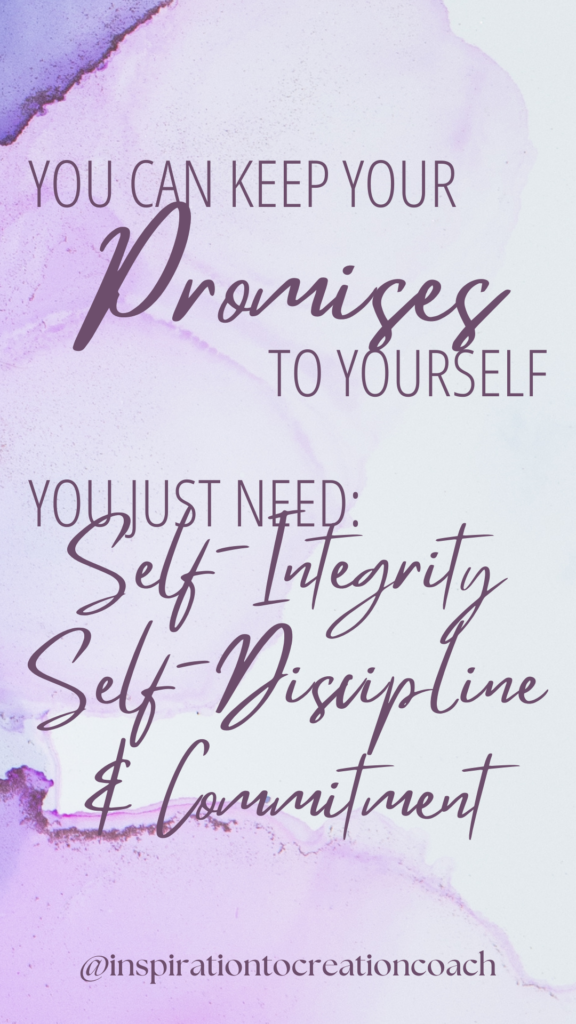Look at your life, and you’ll see your commitments. For example, you might be committed to watching the news on TV for an hour every night, exercising daily, eating chocolate when you feel stressed, drinking 16 ounces of water when you wake up, being angry, or staying in your comfort zone. And you’re likely self-integral and self-disciplined about keeping those commitments.
Self-integrity, which involves keeping your promises (commitments) to yourself, increases with discipline. Discipline, a strategy used to control or force a specific behavior—like keeping a promise to yourself, results in a higher level of self-integrity. And both self-integrity and self-discipline lead to the ability to keep your commitments.
Think of it like a process:
- Make a commitment to yourself.
- Discipline yourself to follow through on that promise to yourself.
- Keep your commitment.
Are You Committed?
Are there things you say you are committed to doing but don’t do consistently? For instance, maybe you have promised yourself to wake up when the alarm rings in the morning. Yet, you don’t keep that promise, and instead, you hit the snooze button twice when the alarm rings, effectively losing that extra half hour.
It would be easy to deduce that you lack commitment, and that could be true. If you think you “should” get up earlier or your partner wants you to do so (and you don’t), you probably aren’t as committed as you might say.
On the other hand, you might not keep your commitment because you need higher levels of self-integrity and self-discipline. For example, you want that extra 30 minutes for a morning routine, but you must train yourself to follow through and take action consistently.
So, first, decide if you are genuinely committed. Do you want to keep your promise to yourself? If so, it’s time to develop more self-discipline and self-integrity.
Self-Integrity and Self-Discipline Help Keep Commitments
Let’s use me as an example. I am committed to my health and, therefore, promise myself to exercise five days per week. But unfortunately, I’m committed to this activity but not always self-integral or self-disciplined. So sometimes I tell myself I’ll exercise but don’t.
 So, I’ve worked on raising my level of self-integrity. I decided to BE someone who has self-integrity, especially around health and exercise. As a result, I exercise consistently and keep my promise to myself.
So, I’ve worked on raising my level of self-integrity. I decided to BE someone who has self-integrity, especially around health and exercise. As a result, I exercise consistently and keep my promise to myself.
That said, doing so takes self-discipline. For example, I have had to train myself to exercise right after I walk the dog. I’ve even given myself a consequence for not doing so, like not allowing myself to have dessert after dinner. And if, for some reason, I don’t exercise in the morning, I do it later in the day. I even use a habit tracker to help me visualize my exercise streak.
If I don’t keep my commitment, I make a new plan…like exercising on a day I hadn’t scheduled a workout. That way, I still get five days of exercise in each week.
With self-integrity and self-discipline, I keep my commitment and exercise five days weekly. And after a while, working out becomes habitual, and I don’t need to worry about my integrity or discipline.
How to Develop Commitment
A delicate interplay exists between commitment, self-integrity, and self-discipline. So often, we don’t realize how we unconsciously commit to things and develop self-integrity and discipline around them—even when the actions don’t serve our highest good. (I bet you didn’t have to work hard to commit to having coffee every morning, right?)
Again, look at your life and what you say you’re committed to doing. For example, suppose you are committed to watching TV every night. In that case, you’re self-integral and self-disciplined about that commitment, whether you realize it or not. Every day you’ll recommit—thinking about what you’ll watch and planning how to do so. You don’t consciously think, “I promise myself that I’m going to watch TV tonight.” But you have, and you keep that promise.
Plus, you’re going to be disciplined about that TV-time commitment. You might consciously tell yourself, “I have to finish my work, eat dinner, and clean up by 8 p.m. because that is when I begin watching TV.” And you do just that…every night.
That type of commitment seems to take almost no effort or thought. And you are truly committed as well. Thus, you don’t have to increase your self-integrity or self-discipline.
Other commitments, not so much. Don’t believe me? List all the things you say you are committed to but haven’t managed to do consistently. These commitments require more self-integrity and self-discipline.
How Commitment Helps Achieve Your Goals
You will keep your promises to yourself when you have commitment, self-integrity, and self-discipline. And you’ll move quickly toward goal achievement.
Let’s say you’re committed to writing a book. To keep that promise to yourself, you decide to be self-integral. You say, “I always keep my promises to myself.”
Then, you set smaller goals, like writing five days per week or producing 2,000 words per week. To achieve these goals, you decide, “I am disciplined.”
You put writing dates on your calendar and keep them—because you have decided to be both self-integral and self-disciplined. You have chosen to develop these characteristics. Maybe you level up both these traits by treating these writing dates like doctor’s appointments that can’t be missed without penalty; thus, you pay a friend $20 every time you miss your “appointment.”
Or you simply decide that you are now a self-integral and self-disciplined person—you choose that identity. Then, your habits and mindsets follow suit, allowing you to write consistently. Finally, you do what you commit to because you are the type of person.
The Positive Side of Being Disciplined
For some people, “discipline” has a negative connotation. It seems like a harsh word or way to approach keeping commitments to yourself (or anyone else). You might think discipline is restrictive and makes you feel trapped or like someone judged “bad.”
However, the word also can have a positive connotation. After all, it is a good thing when you positively use discipline. For instance, using discipline to help you lose weight and live longer is also good. The same is true if you employ discipline to start your new business, stay connected to your family or friends, or make meditation a habit.
In fact, discipline should make you feel good about yourself. When you’re self-disciplined, you allow yourself to become self-integral. Ultimately, keeping promises to yourself feels pretty great. Why? Because you’ve followed through on your commitment.
Imagine you committed to intermittent fasting and only eating between 12 p.m. and 8 p.m. every day for six months. You promised yourself you would do it and kept that promise by being disciplined about when you ate.
At the six-month marker, how would you feel about yourself? Pretty great, right? Of course.
The Spiritual Side of Commitment
Most people would lump learning to be self-integral, self-disciplined, or committed into a personal growth bucket. However, these traits also have a spiritual growth element.
Often you commit to things about which you feel passionate or interested. Or you commit to doing something you feel called to do or that is meaningful or purposeful for you.
A sense of passion, interest, calling, meaning, interest, or purpose are the ways your soul tells you something is aligned for you. So, if you are excited about committing to something, see that as spiritual guidance.
Then, developing self-integrity and self-discipline become spiritual practices to help you keep your spiritually guided commitments. And they help you fulfill your spiritual and human potential.
If you don’t develop self-integrity and discipline to keep your commitment, you will continue doing what’s comfortable. You won’t stretch yourself, and only through stretching do you grow.
Commit to Fulfilling Your Potential
Your soul came into your body in this lifetime to achieve its spiritual and human potential. You accomplish that by developing commitment.
As you follow through on your soul-inspired commitments by developing self-integrity and self-discipline, you move toward achieving your potential. So, commit with an appreciation for what you’re doing and achieving and who you are becoming.
Do you keep your commitments to yourself?
Tell me in a comment below. And please share this post with a friend or on social media.
If you want to increase your ability to create desired results—like keeping your commitments, let’s chat. Get on my calendar here. Or join the Inspired Creator Community for group personal and spiritual growth coaching every month. It’s in this community that real transformation happens…
 It’s time to transform, is it not? Join the Inspired Creator Community. As a member, you will discover how to change from the inside out. Finally, be the person who does the things that allow you to create what you desire. Gain access to intuitive transformational coaching, world-class Certified High Performance Coaching, and strategies for living a life that feeds your soul. As you will discover, you are a powerful creator. It’s time to create what you want. Join now!
It’s time to transform, is it not? Join the Inspired Creator Community. As a member, you will discover how to change from the inside out. Finally, be the person who does the things that allow you to create what you desire. Gain access to intuitive transformational coaching, world-class Certified High Performance Coaching, and strategies for living a life that feeds your soul. As you will discover, you are a powerful creator. It’s time to create what you want. Join now!Photo courtesy of Ramiro Pianarosa .


